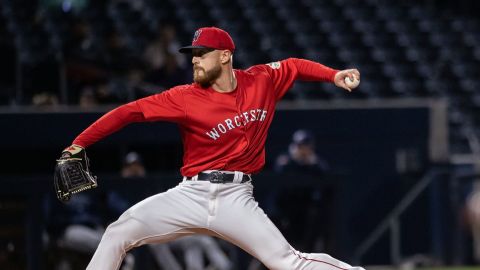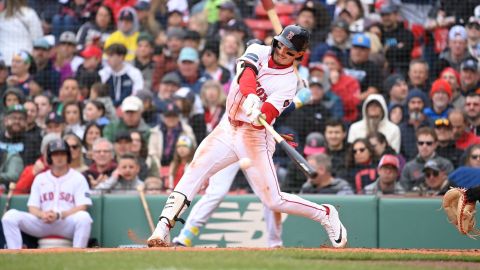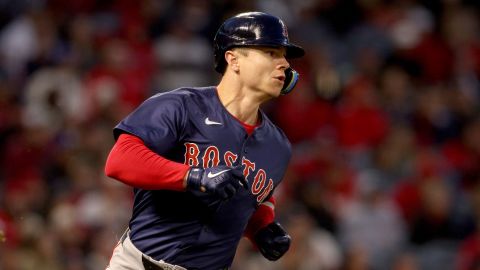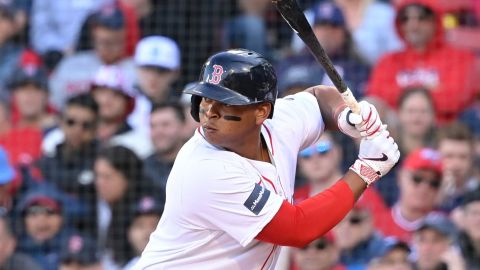With David Ortiz's recent hot streak landing his name in the MVP conversation, now is as good a time as ever to tackle a question that has divided baseball since 1973: Should a full-time designated hitter be able to win the American League MVP award?
Thirty-nine years of evidence suggests that the Baseball Writers Association of America — the committee that votes on the AL MVP — thinks the answer to this question is no. But just because the BBWAA believes something doesn't make it right. Remember, this is the same group that consistently fails to elect surefire Hall of Famers — such as Cal Ripken Jr. or Tony Gwynn — to the Hall of Fame unanimously because some of its members hold on to stubborn beliefs such as "no one should be voted in on the first try."
Since the AL adopted the designated hitter in 1973, no full-time designated hitter has won the MVP award. Three players — Jim Rice in 1978, Don Baylor in 1979 and Juan Gonzalez in 1996 — have seen significant time at the position the same year they won the MVP. But none played the majority of their games at the position, the closest call being Baylor's 65 appearances at DH in '79. Players representing every other position on the diamond have won the award since '73, including three relief pitchers. So why does the designated hitter get overlooked?
The thinking goes that a designated hitter has only one job: to hit. He doesn't play defense, so for him to be more valuable than a position player, his performance at the plate should be significantly better. The problem with this logic is that even when a designated hitter has had a season statistically superior to a position player, he often gets shafted when it comes to MVP voting.
One of the best examples comes from 2006, and one of the main guys who lost out was none other than Ortiz. That year, the Twins' Justin Morneau won after putting together a line of 34 home runs and 130 RBIs to go with a .321 batting average, .375 on-base percentage and .934 on-base plus slugging. A good season to be sure, but Morneau's Wins Above Replacement was 4.0, just 19th among AL players.
Ortiz, on the other hand, had much better power numbers than Morneau (54 home runs, 137 RBIs, both tops in the AL) and, although his batting average was just .287, his OBP (.413), OPS (1.049) and WAR (5.5) were all considerably better than Morneau's.
So why did Ortiz miss out? Well, the fact that Ortiz played on a third-place team while the Twins won their division certainly helps, although Minnesota won just 10 more games than Boston. But the biggest reason was likely because Morneau played first base and Ortiz didn't, a deal-breaker for most MVP voters. Apparently the voters don't understand that Ortiz, like most designated hitters, doesn't just twiddle his thumbs on the bench when he's not hitting. He watches video of his at-bats or takes extra swings in the batting cage — you know, things that will help him become a better player and help the team win games.
Ironically, Ortiz may not have even been the best designated hitter that year. The Indians' Travis Hafner also put up phenomenal numbers despite missing 33 games. Pronk hit 42 homers, drove in 117 runs and led the league in OBP (.439), slugging percentage (.659) and OPS (1.097) to go with a 5.7 WAR.
Another reason why designated hitters should be able to win the award is because of another position that has won in the past: pitcher. Since 1973, five pitchers have won AL MVP. Three of them — Rollie Fingers, Willie Hernandez and Dennis Eckersley — were relief pitchers. Yet, no matter how effective they are, relievers only tend to pitch for an inning or two at most while playing a fraction of their team's games. The three MVP relievers averaged just over 65 appearances per season — and yet the designated hitter is the one penalized for not playing enough.
There's no doubt that Eckersley was great when he won the award in 1992. He was 7-1 with a 1.91 ERA and 51 saves along with a 0.91 WHIP and 93 strikeouts in 80 innings pitched. But was he really better than a designated hitter like Dave Winfield, who that season had a stat line of 26 homers, 108 RBIs and averages of .290 BA, .377 OBP and .867 OPS? Winfield may have been less dominant, but he had a far greater impact on the game than Eckersley, as he notched 670 plate appearances in 156 games. Eckersley, meanwhile, faced just 309 batters and appeared in only 69 games. Both of their teams won their divisions and finished with identical 96-66 records. But Winfield was undoubtedly more valuable to his team because he played a bigger part in those victories than Eckersley did.
There's a similar argument to be made against starting pitchers, who play just one of every five games — although it can be argued that they have by far the biggest impact in those games (but that's a whole other debate). Ultimately, though, the fact that any pitcher can win the award is the biggest reason why a designated hitter should be able to as well. If a player — like Ortiz or Hafner in '06 or Justin Verlander in '11 — is dominant enough and has the numbers to back it up, it shouldn't matter what position they play when it comes to MVP voting.



